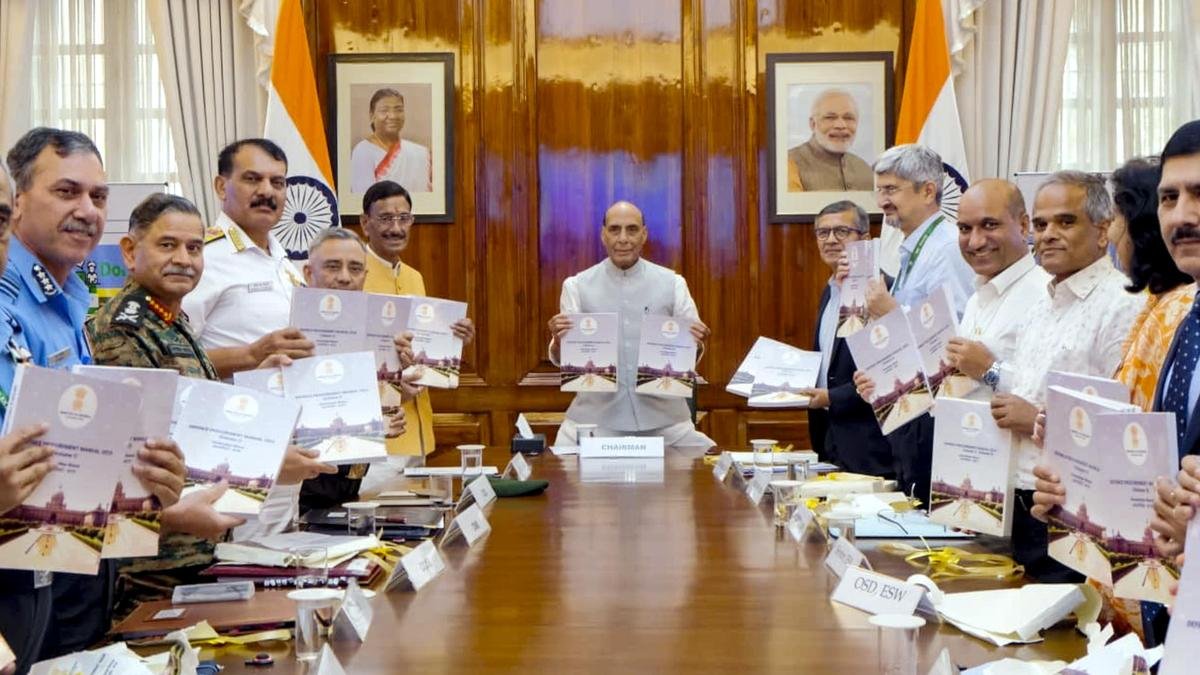Revised Defence Procurement Manual 2025 reserves 25% contract for MSMEs


Defence Minister Rajnath Singh with MoS for Defence Sanjay Seth, Chief of Defence Staff (CDS) General Anil Chauhan, Navy Chief Admiral Dinesh K. Tripathi, Army Chief Upendra Dwivedi and others during the release of Defence Procurement Manual 2025 at an event, in New Delhi
| Photo Credit:
–
The Defence Procurement Manual (DPM) 2025, released by the Ministry of Defence on Thursday, introduces a 25 per cent product reservation for Micro and Small Enterprises (MSMEs) and offers significant relaxations for start-ups recognised by the Department for Promotion of Industry and Internal Trade (DPIIT).
The aim is to spur innovation and strengthen the supply chain resilience to develop a globally competitive domestic defence manufacturing ecosystem through a policy push. It also intends to reduce regulatory hindrances as the revised DPM aligns with Ministry of Finance and other Central government procurement norms.
The move is expected to enhance business visibility for around 14,000 MSMEs and over 350 defence start-ups. It follows a directive from the Ministry of MSME that mandates all central ministries, departments, and PSUs to source at least 25 per cent of their annual procurement from smaller enterprises.
The DPM 2025 clarifies that defence armament imports will not count towards this 25 per cent target. Furthermore, major weapon systems, missiles, and military equipment spares remain outside the purview of this reservation policy.
Responding to long-standing industry demands, the revised manual relaxes the ‘prior turnover’ and ‘prior experience’ requirements for eligible start-ups, provided they meet quality and technical specifications. Recognising their financial constraints, both MSMEs and start-ups are exempted from bid security or earnest money deposits (EMD).
In addition, all ease-of-doing-business measures under the iDEX and similar innovation schemes—already incorporated in the Defence Acquisition Procedure (DAP) 2020—will automatically apply to procurements under the new manual.
The DPM 2025 introduces three new chapters, including Chapter 10 titled “Promoting Self-Reliance through Innovation and Indigenisation.” The chapter encourages the development and indigenisation of defence items and spares through collaboration between the Services, industry, academia, and premier institutions such as IITs and IISc, tapping into young talent and emerging technologies.
Valued at approximately ₹1 lakh crore for FY26, revenue procurements under the new manual form a crucial component of defence spending. The manual seeks to enhance fairness, transparency, and accountability while expediting decision-making and eliminating procedural bottlenecks and entry barriers.
For ease of reference, DPM 2025 is structured into two volumes— Volume I covers core procurement procedures across 14 chapters and Volume II includes related forms, appendices, and government orders.
Appendix D of Volume II outlines indicative procurement timelines, suggesting contract conclusion within 18–19 weeks for single-bid, 22 weeks for two-bid, and 24 weeks for two-stage bidding processes. This has been done to address grievance regarding long procurement cycle which is contrary to shorter shelf life new age technologies, which are being inducted into Army, Navy and Air Force.
Defence Minister Rajnath Singh, who had earlier declared 2025 as the “Year of Reform,” was of the view on Thursday that the new manual represents a decisive step towards transforming procurement systems.
Defence Secretary Rajesh Kumar Singh has been emphasising over the need to reduce entry barriers for private industry and start-ups, fostering grassroots innovation, and ensuring competitive, transparent, and efficient procurement across the Services.
Published on October 24, 2025


